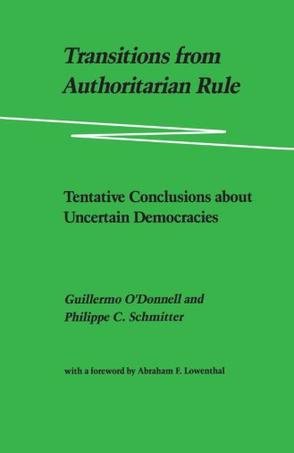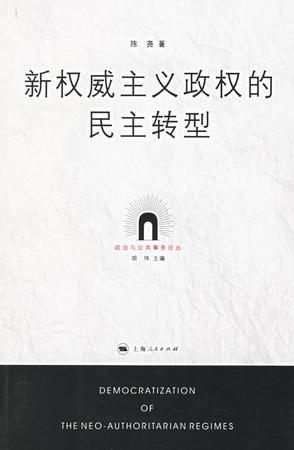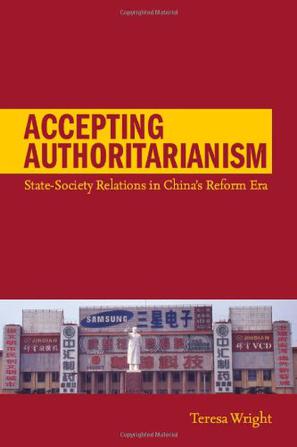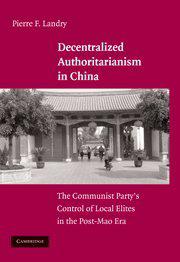-

Transitions from Authoritarian Rule, Vol. 4
Review "The essays appearing in the collection 'Transitions from Authoritarian rule'...will serve as reference points for students of redemocratization for years to come. Other essays will serve as classic case studies...the volumes deserve to be read time and again."--Nancy Bermeo, 'Comparative Politics' Review "The essays appearing in the collection Transitions from Authoritarian rule... will serve as reference points for students of redemocratization for years to come. Other essays will serve as classic case studies... the volumes deserve to be read time and again." -- Nancy Bermeo, Comparative Politics -

新权威主义政权的民主转型
20世纪70年代中期兴起的全球范围向民主的转型,标志着民主事业在人类政治文明发展进程中迈出了关键一步。
绝大多数有关这一时期民主化原因的研究均归结于外力或政治之外因素的作用,比如国际力量的推动、经济结构危机、邻国的示范效应,即使极少数学者从政治本身出发,也只是从精英选择的角度分析,很少有学者将研究的重点放在政治体制和政权内部结构。按照马克思主义的观点,这些研究方法忽视了社会活动的基本规律,即任何事物在其发展进程中,变革的决定性因素在于内部而不是外部,换言之,事物的发展取决于内因而不是外因。因此,政治变革中的民主化的根本原因在于前民主化政权内部结构的问题,本书正是从这一角度出发,研究新权威主义政权内部的结构变化所导致的民主转型。
本书分为七个部分。
第一章为引论。分析了选题的原因、研究方法和研究所要注意的几个方面。在20世纪末的民主化背景下,人们对新权威主义政权的转型认识是模糊的,对新权威主义政权的发展历程及其历史命运难以把握。理论上的模糊也使得政治精英们的选择失去了方向,从而使政治变迁显得扑朔迷离,政治现代化的进程充满艰难。如何理解新权威主义政权转型的根本动因,是本书尝试进行解释的。关于新权威主义政权的研究在理论上主要有两个来源:比较研究方法和政治发展理论,对此本书作了简单的回顾。此外,这一部分还对研究所注意的几个方面进行了简要提示。
第二章为概念与理论。对权威主义、新权威主义的概念进行了梳理,并从两个维度——意识形态和政权形态分析了权威主义的表现形态。
第三章分析了新权威主义政权的兴起。新权威主义政权是现代化进程的产物,是现代化进程中制度变迁在政治结构体制上的反应,这种反应受到了殖民主义的历史、前现代化的经济结构、政治文化传统等因素的重要影响,同时也受制于社会发展过程中的即时事件的作用。发展中国家进行了制度容纳的尝试,包括多元民主体制、形形色色的社会主义体制及寡头或军人政权,但大多不成功。在工业化进程及其带来的社会、经济危机的冲击下,少数发展中国家最终选择了新权威主义体制。
第四章分析了新权威主义政权的结构及结构性危机。结构是研究政治的一个关键性变量。新权威主义政权内部存在两种结构:专制结构和同意结构。专制结构主要由行政首脑及行政机构、军队、技术官僚和政党组成。同意结构则由代议机构、利益集团、公共舆论和社会运动组成。新权威主义政权中专制结构和专制权力占据了主导地位,同意结构和同意权力很少或几乎不发挥作用,政权主要依靠强制、镇压、说服来维持社会秩序和推动经济增长。现代化发展和社会变迁导致新权威主义政权内部的专制结构和同意结构之间形成了一种张力,这种张力是新权威主义政权不稳定的根源。新权威主义政权试图建立各种协调机制缓解张力,但政权的性质决定了专制结构的地位不可能被取代,从而也就决定了政权不可避免地走向危机。
第五章围绕新权威主义政权的有效性和合法性展开论述。新权威主义政权的结构性危机并不导致其即刻的解体,政权的有效性在一定程度上维护了政权的生存。新权威主义政权的有效性来源于其对经济发展的推动作用。通过对政治结构与经济发展之问关系的考察,本书认为,政治发展与经济发展之间并没有简单、直接的逻辑关系,新权威主义政权相对于其他发展中国家取得了较大的经济发展成就,不在于其经济发展战略或政策的合理,而在于政权的能力。经济绩效在一定程度上维护了政权的合法性,但有效性不等于合法性,现代化发展到了一定时期,政权的有效性也就无法满足社会对政权合法性的要求。这种外部因素仍然不能克服政权结构本身内在的结构性危机。
第六章描述了新权威主义政权在“第三波”民主化浪潮中的解体。新权 威主义政权的结构性危机在内部和外部因素的推动下终于全面爆发,在体制上逐步向民主转型。但是,由于大多数转型是外部力量的推动或政治精英的主动选择,因此转型后面临着政治体制的巩固问题。如何巩固民主体制是新权威主义政权在转型之后必须应付的重大挑战。
最后一部分分析向民主转型后的新生民主政权在巩固民主制度方面的努力,以及这些政权在民主制度巩固过程中受到的影响因素,包括社会经济因素、政治传统、转型的方式、情境问题以及具体民主制度的选择等。不同的影响因素对转型后的民主政权的巩固产生了不同的作用。尽管有少数国家仍然处于转型后的动荡之中,但大多数政权在转型之后基本上坚持了下来。
至今为止,新权威主义政权在民主道路上尽管艰难,但却始终朝向民丰的目标前行。 -

Accepting Authoritarianism
Why hasn't the emergence of capitalism led China's citizenry to press for liberal democratic change? This book argues that China's combination of state-led development, late industrialization, and socialist legacies have affected popular perceptions of socioeconomic mobility, economic dependence on the state, and political options, giving citizens incentives to perpetuate the political status quo and disincentives to embrace liberal democratic change. Wright addresses the ways in which China's political and economic development shares broader features of state-led late industrialization and post-socialist transformation with countries as diverse as Mexico, India, Tunisia, Indonesia, South Korea, Brazil, Russia, and Vietnam. With its detailed analysis of China's major socioeconomic groups (private entrepreneurs, state sector workers, private sector workers, professionals and students, and farmers), Accepting Authoritarianism is an up-to-date, comprehensive, and coherent text on the evolution of state-society relations in reform-era China. -

Decentralized Authoritarianism in China
-

Populist Authoritarianism
Populist Authoritarianism as an original theoretical framework in understanding authoritarian regimes in general and the dynamics of Chinese politics in particular. The range of public opinion surveys used in the book is unprecedented. Few researchers possess the historical and scientific evidence that allow them to compare change of public opinion A balanced and nuanced discussion about one of the most popular governments in the world that feels paranoid in a political environment that does not provide institutional guarantee for regime stability -

Popular Support for an Undemocratic Regime
To survive, all forms of government require popular support, whether voluntary or involuntary. Following the collapse of the Soviet system, Russia's rulers took steps toward democracy, yet under Vladimir Putin Russia has become increasingly undemocratic. This book uses a unique source of evidence, eighteen surveys of Russian public opinion from the first month of the new regime in 1992 up to 2009, to track the changing views of Russians. Clearly presented and sophisticated figures and tables show how political support has increased because of a sense of resignation that is even stronger than the unstable benefits of exporting oil and gas. Whilst comparative analyses of surveys on other continents show that Russia's elite is not alone in being able to mobilize popular support for an undemocratic regime, Russia provides an outstanding caution that popular support can grow when governors reject democracy and create an undemocratic regime.